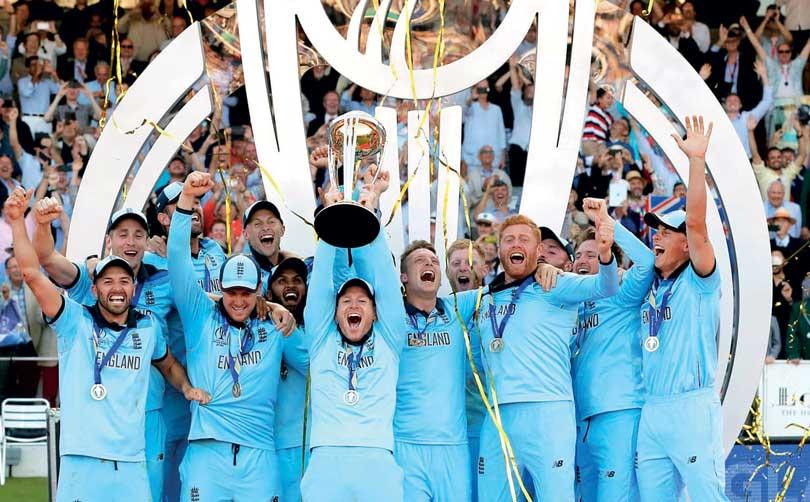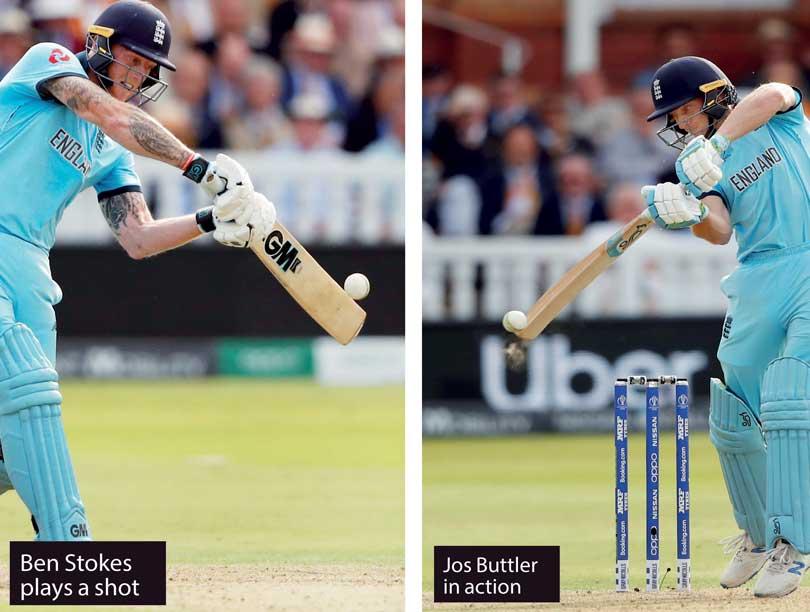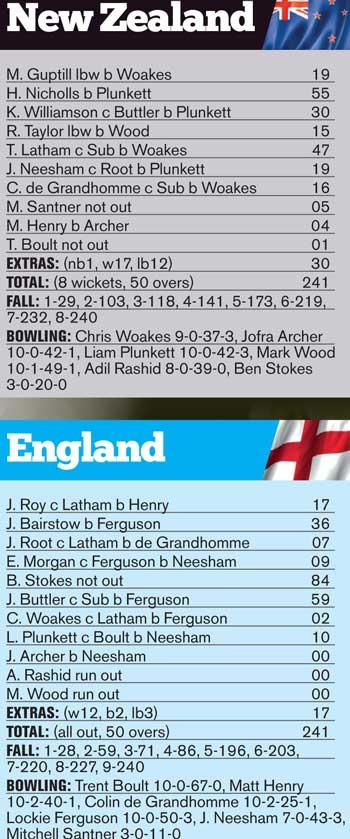15 Jul 2019 - {{hitsCtrl.values.hits}}

.England Team celebrates with the trophy
By Shehan Daniel reporting from Lord’s
They did it the hard way and with the finest of margins possible, but England finally ended their 44-year wait for a Cricket World Cup title at Lord’s yesterday.
It was the closest final in history – it could not possibly be any closer – with the game tied after 50 overs and again after the subsequent super-over, before England were deemed champions on superior boundary count after 102 overs of cricket.
England had 24 boundaries, while New Zealand had 16.
The hosts were asked to bat first in the super-over, having batted second in the 50-over match, and Ben Stokes and Jos Buttler, whose 110-run partnership had brought England to within 46 runs of victory in the ‘regulation period’ scored 15 off the six balls.
Jofra Archer, whose fast-track into the national team had been a topic of debate, conceded 14 off the first five balls of New Zealand’s super over, but with two needed off the last ball, New Zealand’s Martin Guptill was run out attempting the winning run, with England winning on count-back.
The International Cricket Council (ICC) had made a plea to the Indian fans who had already bought 41 percent of the tickets to the final to either attend the match or re-sell them at its face value, in the fear that the final could be played in front of empty seats, but you couldn’t say that there was any such possibility by the incredible atmosphere it was played, with very few empty seats, and a vocally partisan home crowd.
It may have been Archer who delivered the over that won England the World Cup, but it was Ben Stokes’ 84 off 98 balls that proved the most crucial and controversial contribution, as the game reached a thrilling finish.
England had restricted New Zealand 241 in 50 overs, needed 15 off their last over, with Stokes on strike.
Trent Boult delivered two dots balls before Stokes cracked a six over mid-wicket to bring the equation to nine off three balls.
Then, in what was perhaps the moment that will be the most talked about from this final, Martin Guptil’s throw from the deep mid-wicket boundary off the next ball hit the bat of a diving Stokes, trying to make his ground after a second run, and ran to the third man boundary.
It would have been a cruel way for New Zealand to lose a World Cup final, but so was the ultimate margin of victory that saw them miss out on the title.
Both sides protested - New Zealand asking for it to be waived off, and Stokes pleading it was not intentional - but after deliberation between both Umpires, the runs stood as the equation drastically reduced to three off two.

Two runs and two run outs off the last two balls saw the match send into cricket’s version of a penalty shoot-out.
In the lead-up to their semi-final against India, Kane Williamson had tried to make his case that New Zealand deserved to be in the final four, and there is no doubt they deserved to even win the whole tournament, if not for one of the most cruel determinants in the sports.
When Buttler and Stokes were at the crease it looked a matter of time before England wrapped up the game with some comfort but with 46 needed in six overs the English wicket-keeper was caught in the deep and took the match into nerviest passage of play
At one end Stokes was keeping England’s chase alive, but New Zealand pried out wickets at the other, including four off the last 10 balls.
The partnership between Stokes and Buttler, started in the 24th over and with England’s top four batsmen removed for a total of 86, was worthy of being a match winning contribution of its own, had it not been for New Zealand staying in the game, and ensuring the England were always behind the required run-rate.
It was only after Butter was dismissed that Stokes took on a more aggressive approach, having up to then scored 51 off 81 - his next 33 runs coming off 17 balls while also shepherding the English tail.
For that, Stokes was named Man-of-the-Final, while Kane Williamson was adjudged as Man-of-the-Series.
That England were able to restrict New Zealand to a target that, numerically at least, they would have felt comfortable chasing, proved once again that the hosts were more than just the best batting line up in the tournament.
Collectively their bowlers were outstanding – with the exception of Ben Stokes who conceded 20 runs in three overs – making good use of conditions where guile and variation were more valuable than all out pace and the English were rewarded with crucial breakthroughs in the middle overs that meant New Zealand could never really build a prolonged partnership.
Those wickets meant that outside of Henry Nicholls’ ninth ODI half century, Tom Latham’s scratchy 56-ball 47, and Kane Williamsons’ 30, there were no threatening contributions from the Kiwi batsmen.
After losing opener Martin Guptil for 19 in the seventh over, Williamson and Nicholls put on New Zealand’s most productive partnership of 74, but they were dismissed in the space of three Liam Plunkett overs, with the English bowlers turning the screws.
After Ross Taylor was New Zealand’s fourth wicket, with the score on 141, Latham put on partnerships of 32 and 46 with Jimmy Neesham and Colin de Grandhomme, before he was caught in the penultimate over.
England had 24 boundaries, while New Zealand had 16

20 Apr 2024 25 minute ago
20 Apr 2024 2 hours ago
20 Apr 2024 3 hours ago
20 Apr 2024 3 hours ago
20 Apr 2024 3 hours ago